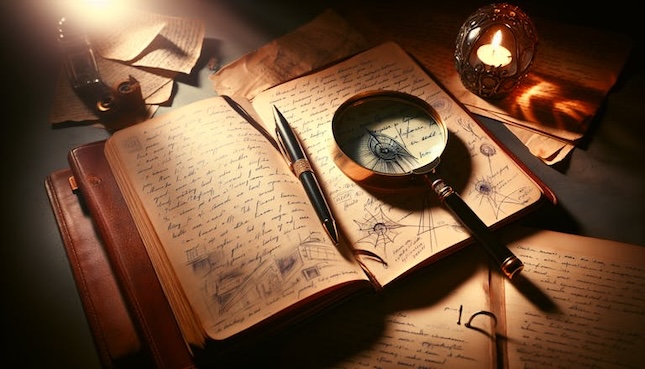From Clues to Conclusions: The Top 5 Skills Every Mystery Writer Needs to Succeed

If you have a knack for crafting compelling mysteries that keep readers on the edge of their seats, you are in for an exciting journey. As a mystery writer, you possess a unique ability to create captivating narratives filled with suspense, intrigue, and unexpected twists. Whether you are an aspiring writer looking to delve into the world of mysteries or an experienced wordsmith seeking to enhance your craft, mastering certain skills is essential to excel in this genre.
Let’s explore the top five skills you must master as a mystery writer. These skills will enable you to tap into your creativity, portray the minutest details, craft well-plotted narratives, conduct thorough research, and strategically incorporate clues and red herrings. By honing these skills, you can captivate readers and take them on thrilling journeys through the pages of your mystery novels.
Skill 1: Creativity and Imagination
As a mystery writer, your greatest asset is your ability to conjure unique and compelling stories that grab your readers’ attention from the first page. It is your creative prowess coupled with a vivid imagination that sets you apart in the world of mystery writing.
When crafting a mystery, generating plot ideas that haven’t been explored before is crucial. Your imagination should soar as you brainstorm intriguing scenarios and unexpected twists that will keep your readers guessing until the final revelation. Think outside the box, challenge the status quo, and let your creative juices flow freely.
Equally important is the art of creating complex and engaging characters. Your protagonists and suspects should leap off the page, captivating your readers with depth and authenticity. Delve into their motivations, fears, and desires, breathing life into each character. Your creative prowess enables you to invent personalities that will mesmerize readers and heighten the stakes in your mystery.
Take inspiration from accomplished mystery writers who have mastered the skills of creativity and imagination. Agatha Christie’s ability to craft intricate puzzles that perplex readers, or Arthur Conan Doyle’s ingenious introduction of Sherlock Holmes and his deductive reasoning—these luminaries of the genre showcase the power of imaginative storytelling.
Allow yourself to explore uncharted territories and concoct narratives that will resonate with readers long after turning the final page. In the world of mysteries, your distinctive approach and inventive storytelling will make your work stand out.
Skill 2: Attention to Detail
Imagine a jigsaw puzzle—a myriad of scattered pieces that eventually form a beautiful and coherent image. In the world of mystery writing, attention to detail is akin to the process of piecing together these fragments to create a captivating and seamless narrative.
As a mystery writer, your ability to pay close attention to small clues and subtle nuances can make all the difference in captivating your readers. Every detail, no matter how seemingly insignificant, has the potential to hold a vital clue or contribute to the overall puzzle. It is your job to carefully scatter these breadcrumbs throughout your story, creating an intricate web of intrigue that keeps readers engaged and invested in solving the mystery alongside your protagonist.
Mastery over attention to detail involves weaving hints and foreshadowing into the fabric of your narrative. By strategically planting these breadcrumbs, you can guide your readers toward a sense of satisfaction when the puzzle pieces come together. A well-crafted twist or a hidden clue that only reveals itself upon closer inspection will leave your readers awestruck and craving more.
In mystery writing, notable authors such as Raymond Chandler and Gillian Flynn have precisely demonstrated the power of attention to detail. Chandler’s iconic detective, Philip Marlowe, tirelessly scrutinized his surroundings for even the faintest hint. At the same time, Flynn intricately layered her narratives with subtle cues that kept readers engrossed until the final revelation.
So, as a mystery writer, embrace your role as a meticulous observer and investigator. Pay attention to the smallest of details, whether it be the enigmatic expressions of your characters, the placement of objects in a room, or the choice of words in a dialogue. Through your acute attention to detail, you can create a world where every clue and nuance matters, intensifying the suspense and ensuring an unforgettable reading experience for your audience.
Skill 3: Plotting and Pacing
In mystery writing, a well-structured and intricately woven plot is the backbone of your story. Your mastery of plotting and pacing keeps readers hooked, eagerly turning the pages to uncover the truth behind the mystery.
To excel in this skill, it is essential to develop a plot that is not only captivating but also possesses a logical progression. Your plot should present a series of challenges and obstacles that your protagonist must overcome, gradually unraveling the layers of the mystery. Each twist and turn should propel the story forward, leading the reader further down the rabbit hole of intrigue.
Pacing plays a critical role in maintaining reader engagement. The art of pacing involves skillfully controlling the speed at which the story unfolds. Proper pacing ensures a balance between moments of tension and moments of revelation, keeping readers on their toes and eager for more. A well-paced mystery builds suspense, heightens emotions, and makes it nearly impossible for readers to put the book down.
Study the works of renowned mystery writers like Dashiell Hammett and Tana French, who have mastered the art of plotting and pacing. Hammett’s gritty noir novels, such as “The Maltese Falcon,” effortlessly weave together complex plots that grip readers until the final page. French’s psychological thrillers skillfully utilize pacing to build tension and suspense, creating an unputdownable reading experience.
As you delve into the world of mystery writing, carefully craft your plot with meticulous attention to detail. Map out the major events, clues, and revelations, ensuring they intertwine seamlessly. Experiment with various pacing techniques, such as mounting suspense, unexpected twists, and sudden revelations, to keep readers engrossed and guessing until the final climax.
By mastering the art of plotting and pacing, you can create mysteries that captivate readers from start to finish. Your ability to construct an enthralling plot and control its pace will transform your storytelling into a rollercoaster ride of suspense and excitement, leaving your readers begging for more.
Skill 4: Research Skills
Behind every well-crafted mystery lies a solid foundation of research. As a mystery writer, you must possess strong research skills to create believable and authentic narratives, adding depth and credibility to your stories.
Thorough research allows you to immerse your readers in a genuine and accurate world. Whether it’s portraying the intricate workings of a forensic investigation, capturing the ambiance of a particular time period, or accurately depicting the nuances of a psychological profile, your research acts as the guiding light that brings realism to your storytelling.
Developing effective research skills involves meticulous attention to detail and gathering accurate information. Dive deep into reliable sources, intermingling facts and insights seamlessly within your narrative. By acquiring a solid understanding of the subject matter, you can craft a world that readers can engage with on multiple levels.
Successful mystery writers like Patricia Cornwell and Michael Connelly demonstrate the power of strong research skills in their works. Cornwell’s meticulous research in forensic science and criminal investigations lends authenticity to her Kay Scarpetta series, while Connelly’s detailed knowledge of police procedures shines through in his Harry Bosch novels. Their commitment to research elevates their storytelling and creates stories that resonate with readers.
As a mystery writer, embrace the role of an investigator and immerse yourself in research. Visit libraries, consult experts in relevant fields, and utilize credible online resources to gather the information needed to enrich your story. Take the time to understand the subject matter thoroughly, allowing you to confidently portray it in a way that captivates and educates your readers.
By honing your research skills, you can create compelling narratives that transport readers into a world where every detail feels credible and every investigation unfolds with authenticity. Your commitment to accurate research will enhance the immersive experience for your audience and establish you as a master of the mystery genre.
Skill 5: Mastery of Clues and Red Herrings
In mystery writing, clues and red herrings are the essential tools that lead readers down a labyrinth of twists and turns. Mastering the art of incorporating clues and red herrings sets apart a proficient mystery writer from the rest.
Clues are the breadcrumbs you scatter throughout your narrative. They provide subtle hints and pieces of information that, when pieced together, allow readers to gradually uncover the mystery’s truth. As a skilled mystery writer, you must know how to strategically place these clues without revealing too much too soon. These breadcrumbs should be cleverly integrated into the story, rewarding observant readers and encouraging them to engage actively in sleuthing alongside your protagonist.
On the other hand, red herrings are the deceptive elements—false trails and misleading information—that divert readers’ attention from the true solution. They create suspense and uncertainty, ensuring that the mystery remains elusive until the very end. Skillfully incorporating red herrings involves misdirecting readers’ assumptions, building suspense, and introducing unexpected turns that keep them guessing and second-guessing their conclusions.
Study the works of acclaimed mystery authors like Agatha Christie and Raymond Chandler to comprehend the art of clues and red herrings. Christie’s masterful manipulation of clues in novels such as “And Then There Were None” keeps readers guessing until the final shocking reveal. Chandler’s skillful use of red herrings in “The Big Sleep” adds layers of complexity, enriching the overall reading experience.
Incorporating clues and red herrings in your mystery requires a delicate balance. You must provide enough information to engage and challenge readers, without making the solution too obvious or convoluted. By perfecting this skill, you can create a thrilling narrative that keeps readers on their toes, anxiously unraveling the web of clues and navigating the treacherous maze of red herrings.
As a mystery writer, you are the architect of the enigma, weaving a tapestry of hints and misdirection. Embrace your role as a master manipulator and guide readers through a captivating journey of deduction. By skillfully incorporating clues and red herrings, you can create an unforgettable reading experience that will leave your audience enthralled and craving more.
Unleash Your Inner Detective
Congratulations, aspiring mystery writer, for exploring the top 5 skills every masterful mystery writer must possess! You have delved into the realms of creativity and imagination, attention to detail, plotting and pacing, research skills, and the mastery of clues and red herrings. By honing these skills, you have equipped yourself with the tools to craft gripping and captivating mystery narratives.
However, the journey does not end here. Just as a detective continually refines their investigative techniques, you too can enhance your mastery of the craft. One way to dive deeper into the art of mystery writing is by enrolling in the Write A Killer Mystery course. This course will provide comprehensive lessons, practical exercises, and expert guidance to develop your skills further and unleash your full potential as a mystery writer.
In Write A Killer Mystery, you will learn advanced storytelling techniques, discover methods to elevate your attention to detail, explore unique approaches to plotting and pacing, and uncover the secrets of conducting effective research for your mysteries. The course also delves into the intricate art of crafting clues and red herrings, enabling you to captivate readers and keep them guessing until the final revelation.
Remember, writing a killer mystery requires practice, feedback, and a commitment to continual improvement. By enrolling in the course, you will join a community of like-minded individuals, share experiences, and receive valuable insights from experienced instructors and fellow students.
Take the next step in your mystery writing journey and enroll in Write A Killer Mystery today. Unlock your potential, refine your skills, and immerse yourself in suspense, intrigue, and unforgettable storytelling. Unleash your inner detective and let your imagination thrive in mystery writing.






